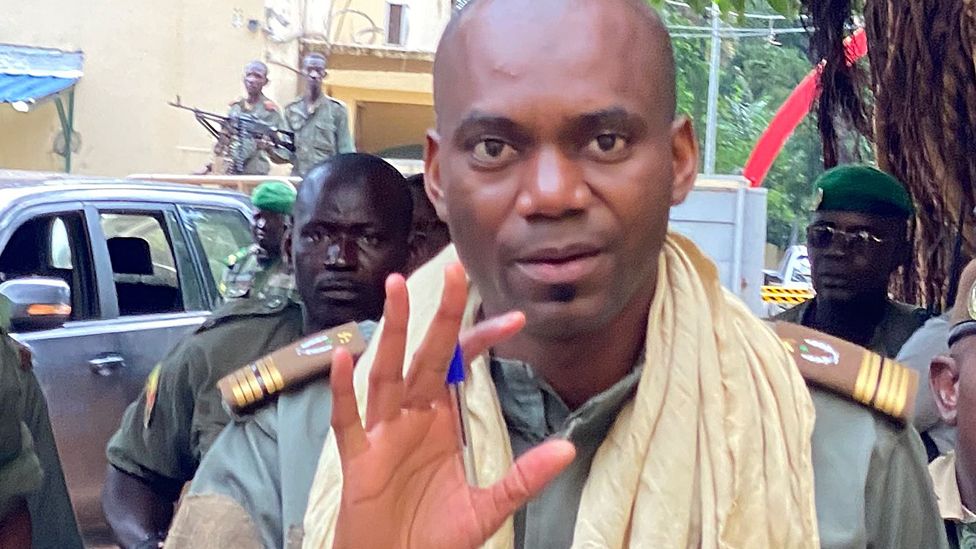The US has imposed sanctions on three top officials of Mali’s junta for their alleged involvement with the Wagner Group of Russian mercenaries.
Wagner fighters have been accused of committing atrocities alongside the Malian army fighting jihadists.
US Secretary of State Antony Blinken said civilian casualties had more than tripled since Wagner forces were deployed to Mali in late 2021.
Mali’s government has never officially acknowledged Wagner’s presence.
But the shadowy mercenary group is believed to have about 1,000 soldiers in Mali, one of several African states in which it operates.
Their deployment had followed a breakdown in diplomatic relations between Mali’s military regime and France, prompting the former colonial power to withdraw its counter-terror troops.
- BBC Africa Live: Updates from the continent
- Boost for Wagner as Mali shuns UN troops, but at what cost?
The three officials sanctioned are Defence Minister Col Sadio Camara, head of the air force Col Alou Boi Diarra and air force deputy head Lt Col Adama Bagayoko.
In a US statement they are accused of being “instrumental in facilitating the Wagner Group’s entrenchment in Mali over the past two years”.
Col Camara and Col Diarra are accused of planning and organising Wagner’s deployment to Mali, while Col Bagayoko is also alleged to be working to secure Wagner’s deployment to neighbouring Burkina Faso and reportedly trying to help it get access to gold mines in Mali.
Since Wagner began working in Mali, in December 2021, civilian casualties have increased by more than 270%, the US says.
“Many of those deaths were the result of operations conducted by the Malian armed forces alongside members of the Wagner group,” Mr Blinken said.
UN researchers and human rights groups have detailed a number of alleged abuses.
A UN report released in May described how Malian soldiers, overseen by Wagner fighters, killed around 500 mostly unarmed civilians in a village in the Mopti region over five days in March 2022.
The Malian government denied wrongdoing and said it would investigate. It later told the UN to withdraw its 12,000-strong peacekeeping force.
This week, rights group Human Rights Watch (HRW) said civilians continued to be summarily executed and forcibly disappeared in central Mali.
Responding to that, Mali’s foreign ministry said it “regretted” the allegations and accused HRW of conducting “biased investigations”, which ignore the asymmetric nature of the jihadist threat facing the country.
“In this regard the government strongly refutes allegations which suggest that anti-terrorism operations lead to ethnic targeting and that these operations supposedly indiscriminately impact civilians,” the statement said.
While Malian officials have said in the past that there are Russian military instructors in the country, they have never admitted the presence of Wagner.
But Russia’s Foreign Minister Sergei Lavrov has said in a media interview that Wagner “provides security services” to the Malian government – and in the wake of Wagner’s failed mutiny last month he said the mercenaries were working as instructors in Mali.
According to a large batch of US military documents leaked earlier this year, Mali has been used as a proxy to acquire weapons from Turkey on Wagner’s behalf, with one Pentagon dispatch saying the junta leader had confirmed it would do so.
Mali has been fighting Islamist militants for more than a decade.
Military leaders, who took power in 2020, currently head a transitional government intended to pave the way for democratic elections.
Related Topics
- Antony Blinken
- Mali
- United States
Around the BBC
-
Focus on Africa podcasts
